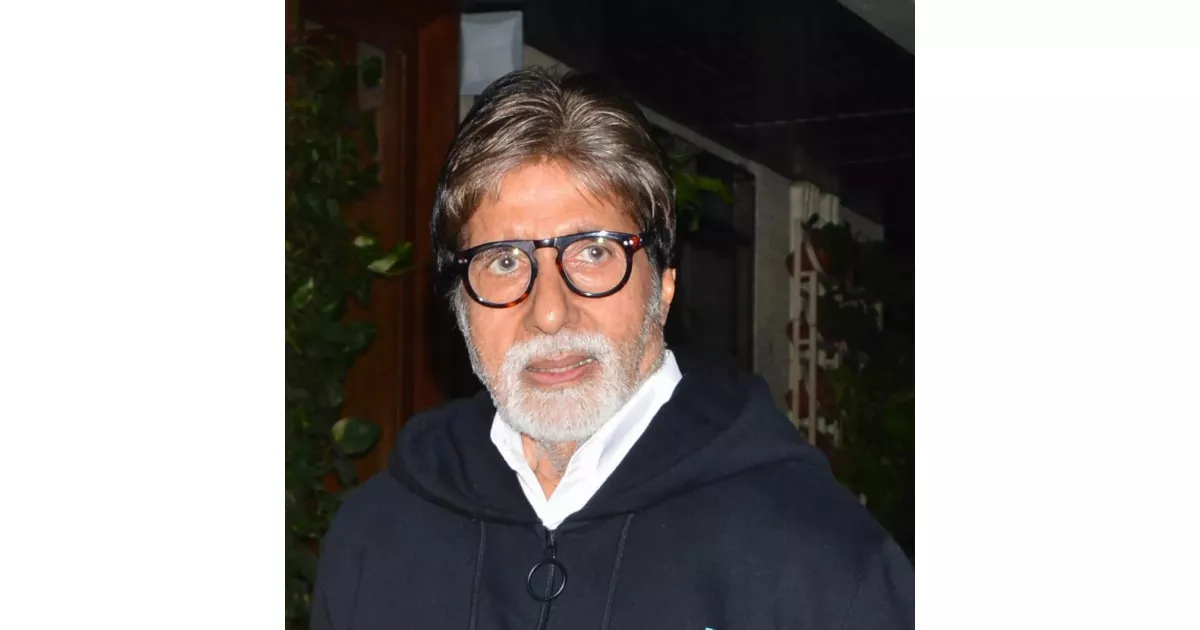Amitabh Bachchan, a renowned Indian actor with a five-decade long career in Hindi cinema, is widely regarded as one of the greatest actors of all time. Having starred in over 200 films, he is considered one of the most accomplished and influential figures in Indian cinematic history. His dominance in the 1970s and 80s led French director François Truffaut to label the Indian film industry a "one-man industry." He is fondly referred to by titles such as "Shahenshah of Bollywood," "Sadi Ke Mahanayak," "Star of the Millennium," or simply "Big B."
October 1942: Amitabh Bachchan's Birth
Amitabh Bachchan was born in October 1942 in Allahabad to Harivansh Rai Bachchan and Teji Bachchan.
1942: Amitabh Bachchan's Birth
Amitabh Bachchan was born in 1942.
1962: Graduation
Amitabh Bachchan graduated from Kirori Mal College in 1962 with a Bachelor of Science degree.
January 1968: Meeting Sonia Gandhi
Amitabh Bachchan received Sonia Gandhi at the Palam International Airport in January 1968.
1969: Film Debut
Amitabh Bachchan began his film career in 1969 as a voice narrator.
1971: Early Roles and Critical Acclaim
In 1971, Amitabh Bachchan starred in "Anand" alongside Rajesh Khanna, earning him his first Filmfare Award for Best Supporting Actor. He also took on his first antagonist role in "Parwana" and made a guest appearance in "Guddi," which starred his future wife, Jaya Bhaduri.
1972: Guest Appearances and Moderate Success
In 1972, Bachchan made a guest appearance in the moderately successful road action comedy "Bombay to Goa." However, many of his films during this period, including "Sanjog," did not perform well commercially.
June 1973: Marriage to Jaya Bhaduri
In June 1973, Amitabh Bachchan married actress Jaya Bhaduri. They have two children together: Abhishek and Shweta.
1973: Marriage and Continued Success
Amitabh Bachchan married Jaya Bhaduri in 1973. The couple appeared in several successful films together, including "Zanjeer" and "Abhimaan." Bachchan also won his second Filmfare Award for Best Supporting Actor for his role in "Namak Haraam."
1973: The Breakthrough Role in "Zanjeer"
By 1973, Bachchan had experienced a string of flops. However, his luck changed when screenwriter duo Salim-Javed cast him as the "angry young man" in "Zanjeer." This groundbreaking role, which broke away from the prevailing romantic hero image, catapulted him to stardom.
1974: A String of Successes
Bachchan's success continued in 1974 with a string of hits, including "Dost," "Kasauti," "Benaam," and his biggest hit at the time, "Roti Kapada Aur Makaan." He ended the year with another success in the Salim-Javed written crime thriller "Majboor."
August 1975: The Release of "Sholay"
"Sholay," starring Amitabh Bachchan, was released on August 15, 1975. The film went on to become the highest-grossing Indian film ever at the time and is considered a landmark achievement in Indian cinema.
1975: Remake of "Sholay"
A remake of Amitabh Bachchan's iconic 1975 film "Sholay," titled "Ram Gopal Varma Ki Aag," was released, but it failed commercially and received poor critical reception.
1975: First Appearance in Box Office India's "Top Actors" List
Amitabh Bachchan made his first appearance on Box Office India's "Top Actors" list in 1975.
1975: Cementing Superstardom with "Deewaar" and "Sholay"
In 1975, Bachchan solidified his superstar status with two iconic films written by Salim-Javed: "Deewaar" and "Sholay." "Deewaar," directed by Yash Chopra, earned him another Filmfare nomination and became a blockbuster. "Sholay," released on August 15, 1975, became the highest-grossing Indian film of all time, further solidifying Bachchan's dominance in the industry.
1976: Top Ranking in Box Office India's "Top Actors" List
Amitabh Bachchan achieved the top ranking in Box Office India's "Top Actors" list in 1976.
1976: Romantic Hero in "Kabhi Kabhie" and Double Role in "Adalat"
In 1976, Bachchan showcased his versatility by starring as a romantic hero in Yash Chopra's musical blockbuster "Kabhi Kabhie" and playing a double role in the hit film "Adalat." His performance in "Kabhi Kabhie" earned him another Filmfare nomination for Best Actor.
1977: First Filmfare Best Actor Award and Box Office Dominance
Amitabh Bachchan won his first Filmfare Best Actor Award for his performance in the 1977 blockbuster "Amar Akbar Anthony." The film, in which he starred alongside Vinod Khanna and Rishi Kapoor, became the highest-grossing film of the year. He followed this success with other hits like "Parvarish" and "Khoon Pasina."
1977: Narration for "Shatranj Ke Khiladi"
Amitabh Bachchan, known for his distinctive baritone voice, lent his narration skills to Satyajit Ray's film "Shatranj Ke Khiladi" in 1977.
1978: Double Roles, Critical Acclaim, and Box Office Success
1978 proved to be one of Bachchan's most successful years. He starred in several hits, including "Kasme Vaade" and "Don," where he played double roles. His performance in "Don" earned him his second Filmfare Best Actor Award. He also received critical acclaim for his roles in "Trishul" and "Muqaddar Ka Sikandar," both of which garnered him Filmfare nominations. Remarkably, all six of his releases in 1978 were box office successes, with three of them becoming the top-grossing films of the year.
1979: Critical and Commercial Success
Amitabh Bachchan achieved significant success in 1979 with films like Suhaag, Mr. Natwarlal, and Kaala Patthar. Suhaag became the highest-earning film of the year.
1980: Continued Success and Nominations
Bachchan's success continued in 1980 with films like Dostana, Ram Balram, and Shaan. He received a Filmfare nomination for his role in Dostana.
1981: Notable Films and Collaborations
In 1981, Bachchan starred in Yash Chopra's Silsila alongside his wife Jaya and Rekha. He also appeared in successful films such as Naseeb, Lawaaris, and Yaarana.
July 1982: Near-Fatal Accident on Set
On July 26, 1982, while filming Coolie, Bachchan suffered a severe injury that required emergency surgery and a lengthy recovery. This incident sparked an outpouring of support from fans.
1982: Double Roles and a Life-Altering Accident
Bachchan took on double roles in Satte Pe Satta and Desh Premee in 1982. However, a near-fatal accident on the set of Coolie led to a long period of recovery.
1983: Coolie Release and Box Office Performance
Despite the accident, Bachchan resumed filming, and Coolie was released in 1983. The film became a blockbuster, partly due to the publicity surrounding his accident.
1984: Return to Films and Political Stint
After recovering, Bachchan starred in Sharaabi, which was released during his three-year political career. The film became a major success.
1984: Allegations Related to 1984 Anti-Sikh Riots
Amitabh Bachchan faced accusations regarding the slogan "blood for blood" in the context of the 1984 anti-Sikh riots. However, he has denied these allegations.
1984: Entry into Politics
Amitabh Bachchan took a break from acting in 1984 to support his family friend, Rajiv Gandhi, by entering politics.
1984: Padma Shri Award
Amitabh Bachchan was honored with the Padma Shri in 1984.
1984: Awarded the Padma Shri by the Government of India
In 1984, the Government of India bestowed upon Amitabh Bachchan the Padma Shri, the fourth-highest civilian award in India, in recognition of his distinguished contributions to the arts.
1985: Success of Mard and Geraftaar
Bachchan's films Mard and Geraftaar, both released in 1985, achieved commercial success. These films solidified his star power during his political career.
1986: Aakhree Raasta Release
Aakhree Raasta, another film starring Bachchan, was released in 1986 and performed well at the box office.
July 1987: Resignation from Politics
Amitabh Bachchan resigned from his political seat in July 1987. This decision was made in the wake of allegations and controversies, including the "Bofors scandal" and speculations about his brother, Ajitabh Bachchan's, involvement.
1987: End of Political Career
Bachchan concluded his three-year stint in politics, marking a return to his acting career.
1988: Comeback with Shahenshah
Bachchan made a comeback to films with Shahenshah in 1988. The film received an overwhelming response and became a box office success.
1989: Decline in Box Office Success
Following his comeback, Bachchan faced a decline in box office success as films like Jaadugar, Toofan, and Main Azaad Hoon failed to perform well.
1990: First National Film Award and Aaj Ka Arjun Success
Bachchan won his first National Film Award for Best Actor for his role in Agneepath. He also experienced success with Aaj Ka Arjun.
1990: Ajitabh Bachchan's Legal Battle
In 1990, Ajitabh Bachchan filed a lawsuit against the Swedish newspaper Dagens Nyheter for linking him to the "Bofors scandal," seeking damages for the allegations.
1991: Last Appearance in Box Office India's "Top Actors" List
Amitabh Bachchan made his last appearance on Box Office India's "Top Actors" list in 1991.
1991: Third Filmfare Best Actor Award
Bachchan received his third Filmfare Best Actor Award for his performance in the action film Hum.
1991: First Recipient of Filmfare Lifetime Achievement Award
In 1991, Amitabh Bachchan became the first recipient of the Filmfare Lifetime Achievement Award. The award was instituted in honor of the legendary actor and filmmaker Raj Kapoor.
1991: Awarded the Order of Afghanistan
The then-President of Afghanistan bestowed upon Amitabh Bachchan the Order of Afghanistan in 1991, recognizing his contributions to the world of cinema and his work in the country during the filming of "Khuda Gawah."
1992: Critical Acclaim for Khuda Gawah and Semi-Retirement
Bachchan's performance in the epic film Khuda Gawah earned him critical acclaim. Following this film, he decided to take a break from acting.
1994: Establishment of Amitabh Bachchan Corporation Ltd.
Amitabh Bachchan established Amitabh Bachchan Corporation Ltd (ABCL) in 1994. The company was involved in event management, production, and distribution.
1994: Delayed Release and Box Office Failure
The highly anticipated film Insaniyat, starring Bachchan and Sunny Deol, finally saw a release but unfortunately flopped at the box office despite a grand opening.
1996: Financial Challenges and Bankruptcy of ABCL
Amitabh Bachchan Corporation Ltd (ABCL) faced financial difficulties and went bankrupt in 1996. The company's struggles were attributed to the failure of films like "Mrityudata" and "Major Saab," which it produced, and the financial losses incurred during the organization of Miss World 1996. Bachchan himself faced near bankruptcy and turned to television work.
1996: Establishment of ABCL and Production of Tere Mere Sapne
During his retirement, Bachchan founded Amitabh Bachchan Corporation Ltd. (ABCL), a production company that released its first film, Tere Mere Sapne, which became a box office hit.
1997: Comeback Attempt and Financial Troubles
Bachchan's attempted comeback film Mrityudaata, produced by ABCL, failed commercially and critically, contributing to the company's financial difficulties.
1998: Commercial Success with Bade Miyan Chote Miyan and Major Saab
Bachchan found renewed commercial success with Bade Miyan Chote Miyan and Major Saab, marking a positive turn in his career.
April 1999: Legal Restraint on Property Sale
In April 1999, the Bombay High Court restricted Bachchan from selling his properties due to ABCL's financial troubles and pending loan cases.
1999: Voted "Greatest Star of Stage or Screen" in BBC Poll
A BBC Your Millennium online poll in 1999 saw Amitabh Bachchan voted as the "greatest star of stage or screen."
1999: Greatest Star of Stage or Screen
Amitabh Bachchan was voted the "greatest star of stage or screen" in a BBC Your Millennium online poll in 1999.
1999: Mixed Success and Critical Acclaim
While Sooryavansham earned Bachchan positive reviews, films like Lal Baadshah and Kohram failed to make an impact at the box office.
June 2000: First Living Asian Modelled in Wax at Madame Tussauds London
In a historic moment in June 2000, Amitabh Bachchan became the first living person of Asian descent to be honored with a wax figure at Madame Tussauds Wax Museum in London.
2000: Crowned "Superstar of the Millennium" at Filmfare Awards
Amitabh Bachchan was bestowed with the prestigious title of "Superstar of the Millennium" at the 2000 Filmfare Awards, solidifying his unparalleled status in the Indian film industry.
2000: Kaun Banega Crorepati Hosting Debut
Amitabh Bachchan's journey as the host of "Kaun Banega Crorepati" (KBC), the Indian adaptation of "Who Wants to Be a Millionaire?," began in 2000. The show was a success.
2000: Acclaim and Award for Mohabbatein
Bachchan's performance in Aditya Chopra's Mohabbatein earned him critical acclaim and his third Filmfare Award for Best Supporting Actor.
2000: Return to Acting
In 2000, Amitabh Bachchan returned to acting after a break in the 1990s.
2001: Padma Bhushan Award
Amitabh Bachchan received the Padma Bhushan award in 2001.
2001: Awarded the Padma Bhushan by the Government of India
Amitabh Bachchan was honored with the Padma Bhushan, India's third-highest civilian award, in 2001, in recognition of his distinguished service of a high order to the nation.
2001: Patriarch Roles and Critical Praise
Bachchan played memorable patriarch roles in films like Ek Rishtaa: The Bond of Love and Kabhi Khushi Kabhie Gham. His acting range was praised in Aks.
2001: Narration for "Lagaan"
In 2001, Amitabh Bachchan provided narration for Ashutosh Gowarikar's historical sports drama "Lagaan."
2001: Awarded "Actor of the Century" at Alexandria International Film Festival
In recognition of his significant contributions to cinema, Amitabh Bachchan was honored with the "Actor of the Century" award at the Alexandria International Film Festival in Egypt in 2001.
2002: UNICEF Goodwill Ambassador for Polio Eradication
Amitabh Bachchan was appointed as a UNICEF Goodwill Ambassador in 2002, focusing on the polio eradication campaign in India.
2002: Honored with the Rashtriya Kishore Kumar Samman
Amitabh Bachchan was honored with the Rashtriya Kishore Kumar Samman, a prestigious award by the Government of Madhya Pradesh, for the year 2002-2003.
2002: Critical Acclaim for Aks and Other Performances
Bachchan's performance in Aks earned him his first Filmfare Critics Award for Best Actor. He received praise for his roles in Aankhen and Kaante.
October 2003: Star of the Millennium
In October 2003, Amitabh Bachchan was named "Star of the Millennium" by TIME magazine.
October 2003: Dubbed "The Undisputed Godfather of Bollywood" by TIME Magazine
In October 2003, TIME magazine recognized Amitabh Bachchan's influence in the Indian film industry by dubbing him "The Undisputed Godfather of Bollywood."
2003: Received Honorary Citizenship of Deauville, France
Amitabh Bachchan was granted honorary citizenship of Deauville, France in 2003.
2003: Harivansh Rai Bachchan's Death
Amitabh Bachchan's father passed away in 2003.
2003: Memorable Role in Baghban
Bachchan delivered a touching performance in the family drama Baghban.
2004: Critical Acclaim and Diverse Roles
Bachchan continued to impress critics with his performances in films like Khakee, Dev, and Veer-Zaara, showcasing his versatility as an actor.
April 2005: Tribute at Lincoln Center
The Walter Reade Theater at Lincoln Center in New York City hosted a special tribute and retrospective titled "Amitabh Bachchan: The Biggest Film Star in the World" in April 2005, honoring Bachchan's contributions to cinema.
2005: Return to KBC for Season 2
Amitabh Bachchan returned to host the second season of "Kaun Banega Crorepati" in 2005.
2005: Release of "Sarkar"
Amitabh Bachchan starred in the film "Sarkar," which was released in 2005. This film later had a sequel titled "Sarkar Raj."
2005: Critical Acclaim and Commercial Success
In 2005, Amitabh Bachchan starred in Sanjay Leela Bhansali's "Black," delivering a critically acclaimed performance as a teacher of a deaf-blind girl. The role earned him numerous awards, including his second National Film Award for Best Actor. Capitalizing on this success, Bachchan became a sought-after brand ambassador and starred in successful films alongside his son, Abhishek, including "Bunty Aur Babli" and "Sarkar."
2005: International UNICEF Goodwill Ambassador
Recognizing his continued efforts, UNICEF appointed Amitabh Bachchan as an International Goodwill Ambassador in 2005.
2006: Continued Success and Family Collaborations
Amitabh Bachchan continued to appear in films with his son, Abhishek, in 2006, with releases like "Kabhi Alvida Naa Kehna." He also starred in movies like "Baabul," which, despite underperforming at the box office, earned him praise for his acting.
2006: Public Statement on Lifestyle
Amitabh Bachchan publicly stated in 2006 that he does not consume alcohol or tobacco.
2006: Hiatus from KBC Due to Illness
Amitabh Bachchan's time hosting the second season of "Kaun Banega Crorepati" was cut short in 2006 due to his illness.
May 2007: Diverse Roles and Box Office Performance
May 2007 saw the release of Amitabh Bachchan's romantic comedy "Cheeni Kum" and action drama "Shootout at Lokhandwala." The latter performed well commercially, while the former gained success gradually.
September 2007: International Film Debut and Critical Acclaim
Amitabh Bachchan debuted in English-language cinema with Rituparno Ghosh's "The Last Lear," which premiered at the Toronto International Film Festival in September 2007. His performance garnered positive reviews and was lauded as one of his best since "Black."
2007: Box Office Success and Critical Praise
Amitabh Bachchan's films "Cheeni Kum" and "Shootout at Lokhandwala" were released in 2007, with the latter becoming a box office hit in India. Although "Ekalavya" and "Nishabd" didn't perform well commercially, Bachchan's performances received critical acclaim.
2007: Teji Bachchan's Death
Amitabh Bachchan's mother died in 2007.
2007: Officer of the Legion of Honour
In 2007, Amitabh Bachchan was honored with the Officer of the Legion of Honour by the French Government.
2007: Conferred with the Officer of the Legion of Honour by the French Government
In recognition of his exceptional career in cinema and beyond, the French government bestowed upon Amitabh Bachchan the Officer of the Legion of Honour, France's highest civilian honor, in 2007.
February 2008: International Project Postponed
Initially scheduled to begin filming in February 2008, Amitabh Bachchan's role in Mira Nair's international film "Shantaram," also starring Johnny Depp, was postponed to September 2008 due to a writer's strike.
May 2008: Release of "Bhoothnath"
Amitabh Bachchan starred in Vivek Sharma's "Bhoothnath," portraying the titular role of a ghost. The film hit theaters on May 9, 2008.
June 2008: Positive Reception for "Sarkar Raj"
The sequel to the 2005 film "Sarkar," titled "Sarkar Raj," was released in June 2008 and garnered a positive response from audiences.
September 2008: International Film Project Shelved
After being pushed back to September 2008, Amitabh Bachchan's international film project, "Shantaram," was indefinitely shelved.
2008: Named "Asia's Sexiest Vegetarian Male" by PETA Asia
Amitabh Bachchan was voted "Asia's Sexiest Vegetarian Male" in a 2008 contest poll conducted by PETA Asia.
2009: Wax Statue at Madame Tussauds New York
A wax statue of Amitabh Bachchan was unveiled at Madame Tussauds New York in 2009.
2009: Bigg Boss Season 3 Hosting
Amitabh Bachchan took on the role of host for the third season of the reality show "Bigg Boss" in 2009.
2009: Critical and Commercial Success with "Paa"
Amitabh Bachchan's performance in "Paa" (2009), where he played his real-life son Abhishek's character's Progeria-affected son, was met with critical acclaim. The film was a commercial success and earned him his third National Film Award for Best Actor and fifth Filmfare Best Actor Award.
March 2010: Named One of the "Top 25 Asian Actors of All Time" by CNN
CNN recognized Amitabh Bachchan's impact on the world of cinema in March 2010 by including him in their list of the "Top 25 Asian Actors of All Time."
2010: Donations to Resul Pookutty's Foundation
Amitabh Bachchan donated to Resul Pookutty's foundation in 2010. The donation was aimed at supporting the establishment of a medical center in Kochi.
2010: KBC Season 4 Hosting
Amitabh Bachchan returned to host the fourth season of "Kaun Banega Crorepati" in 2010.
2010: Malayalam Film Debut
In 2010, Amitabh Bachchan made his debut in Malayalam cinema with "Kandahar," directed by Major Ravi and co-starring Mohanlal. The film was based on the hijacking of Indian Airlines Flight 814, and Bachchan refused any payment for his role.
2010: Received Lifetime Achievement Award at Asian Film Awards
The Asian Film Awards honored Amitabh Bachchan with a Lifetime Achievement Award in 2010, recognizing his exceptional career and contributions to the world of cinema.
August 2011: KBC Season 5 Premiere
The fifth season of "Kaun Banega Crorepati," hosted by Amitabh Bachchan, premiered on August 15, 2011. The season was a massive hit, breaking TRP records.
November 2011: KBC Season 5 Finale and Recognition
The fifth season of "Kaun Banega Crorepati" concluded on November 17, 2011. The show's success led to CNN IBN awarding the "Indian of the Year- Entertainment" to Team KBC and Amitabh Bachchan. The show also received major awards within its category.
2011: Box Office Disappointment
Despite high expectations, Amitabh Bachchan's film "Bbuddah... Hoga Terra Baap" (2011), in which he played a retired gangster protecting his police officer son, failed to perform well at the box office.
2011: Wax Statues at Madame Tussauds in Hong Kong and Bangkok
Wax statues of Amitabh Bachchan were installed at Madame Tussauds in both Hong Kong and Bangkok in 2011.
July 2012: Carried the Olympic Torch in London
At the age of 69, Amitabh Bachchan had the distinct honor of carrying the Olympic torch during the last leg of its relay in London's Southwark borough on July 27, 2012.
September 2012: KBC Season 6 Premiere and Viewership Milestone
The sixth season of "Kaun Banega Crorepati," once again hosted by Amitabh Bachchan, commenced on September 7, 2012. This season, broadcast on Sony TV, achieved the highest viewership for the show up to that point.
2012: Wax Statue at Madame Tussauds Washington, D.C.
A wax statue of Amitabh Bachchan was installed at Madame Tussauds Washington, D.C. in 2012.
2012: Named "Hottest Vegetarian Male" by PETA India
Amitabh Bachchan's commitment to vegetarianism was recognized by PETA India in 2012 when they named him the "Hottest Vegetarian Male."
2012: Support for Delhi Police Officer's Family
In the aftermath of the 2012 Delhi gang rape case, Amitabh Bachchan provided financial assistance to the family of Delhi police officer Subhash Chand Tomar, who died from injuries sustained during protests.
2012: Clarification on Bofors Scandal Allegations
Sten Lindstrom, the Swedish police chief who had investigated the "Bofors scandal," stated in 2012 that Indian investigators had introduced the angle involving the Bachchan family to Dagens Nyheter.
2013: Support for Plan India and Maharashtra Police Welfare Fund
Amitabh Bachchan and his family made significant donations in 2013. They donated to Plan India, a charitable organization working towards the betterment of young girls, and to the Maharashtra Police Welfare Fund.
2013: Hollywood Debut
Amitabh Bachchan appeared in his first Hollywood film, 'The Great Gatsby', in 2013.
2013: Establishment of Harivansh Rai Bachchan Memorial Trust
Amitabh Bachchan established the Harivansh Rai Bachchan Memorial Trust, named after his father, in 2013. The trust collaborated with the Urja Foundation to provide solar-powered electricity to 3,000 homes in India.
2013: Investment in Just Dial and Other Ventures
Amitabh Bachchan made a significant investment in 2013 by acquiring a 10% stake in Just Dial, from which he earned a substantial profit of 4600%. He has also made investments in other businesses, including Stampede Capital, Meridian Tech, and Ziddu.com. However, his name appeared in the Panama Papers and Paradise Papers, leaked documents related to offshore investments.
2013: Hollywood Debut in "The Great Gatsby"
Amitabh Bachchan made his Hollywood debut with a special appearance in Baz Luhrmann's "The Great Gatsby" (2013), sharing the screen with Leonardo DiCaprio and Tobey Maguire.
May 2014: Scholarship Named After Bachchan at La Trobe University
La Trobe University in Australia established a scholarship named after Amitabh Bachchan in May 2014, recognizing his contributions to the arts and his global influence.
October 2014: Summoned by Los Angeles Court
In October 2014, a court in Los Angeles summoned Amitabh Bachchan for allegations of inciting violence against the Sikh community. Bachchan denied these allegations and expressed his willingness to fight the case in court, challenging the accusers to provide evidence.
2014: Support for TeachAids HIV/AIDS Prevention Program
Amitabh Bachchan lent his voice and image to the Hindi and English versions of TeachAids software in 2014. This international HIV/AIDS prevention education tool was developed at Stanford University, and Bachchan's involvement aimed to raise awareness and promote the program.
2014: Television Debut with "Yudh"
Amitabh Bachchan made his debut in fictional television with Sony Entertainment Television's "Yudh" in 2014, playing the lead role of a businessman navigating personal and professional challenges.
2014: Reprising the Friendly Ghost
In 2014, Amitabh Bachchan reprised his role as the friendly ghost in "Bhoothnath Returns," the sequel to the 2008 film "Bhoothnath."
2015: Critical Acclaim and Box Office Success for "Piku"
Amitabh Bachchan's performance as a grumpy, constipated father in Shoojit Sircar's critically acclaimed film "Piku" (2015) was widely praised and contributed to the film's commercial success. The role earned him his fourth National Film Award for Best Actor and his third Filmfare Critics Award for Best Actor.
2015: Padma Vibhushan Award
In 2015, Amitabh Bachchan was honored with the Padma Vibhushan.
2015: Awarded the Padma Vibhushan by the Government of India
In 2015, the Government of India conferred upon Amitabh Bachchan the Padma Vibhushan, the second-highest civilian award in India, for his exceptional and distinguished service.
2016: Critical Acclaim for "Pink"
Amitabh Bachchan's performance as a retired lawyer with bipolar disorder in the courtroom drama "Pink" (2016) garnered significant critical acclaim. The film, known for its women-centric narrative, achieved both critical and commercial success.
2017: Wax Statue at Madame Tussauds Delhi
A wax statue of Amitabh Bachchan was installed at Madame Tussauds Delhi in 2017.
2017: Continuing the "Sarkar" Series and New Projects
Amitabh Bachchan appeared in "Sarkar 3," the third installment of the "Sarkar" franchise directed by Ram Gopal Varma. In the same year, he began filming for the action-adventure movie "Thugs of Hindostan."
2017: WHO Goodwill Ambassador for Hepatitis Awareness
In 2017, Amitabh Bachchan became a WHO Goodwill Ambassador, taking on the role of raising awareness about hepatitis.
May 2018: Reunion with Rishi Kapoor in "102 Not Out"
May 2018 saw the release of "102 Not Out," a comedy-drama featuring Amitabh Bachchan and Rishi Kapoor, reuniting onscreen after 27 years. The film, directed by Umesh Shukla, was based on a Gujarati play by Saumya Joshi.
November 2018: Release of "Thugs of Hindostan"
Amitabh Bachchan starred alongside Aamir Khan, Katrina Kaif, and Fatima Sana Shaikh in the action-adventure film "Thugs of Hindostan," which hit theaters in November 2018.
2018: Dadasaheb Phalke Award
Amitabh Bachchan was awarded the Dadasaheb Phalke Award in 2018.
June 2019: Clearing Farmers' Debts
Amitabh Bachchan demonstrated his commitment to social causes in June 2019 by clearing the debts of 2,100 farmers in Bihar.
2019: Awarded the Dadasaheb Phalke Award
Amitabh Bachchan received the Dadasaheb Phalke Award, India's highest award in cinema, in 2019.
2019: Film Releases: Badla and Sye Raa Narasimha Reddy
In 2019, Amitabh Bachchan appeared in two films: "Badla," directed by Sujoy Ghosh, and "Sye Raa Narasimha Reddy," a Telugu film directed by Surender Reddy, marking his debut in Telugu cinema.
2020: Film Release and Accolade: Gulabo Sitabo
Amitabh Bachchan starred in "Gulabo Sitabo" in 2020, earning him the Filmfare Critics Award for Best Actor.
2020: COVID-19 Public Health Advocacy and Personal Battle
At the start of the COVID-19 pandemic, Amitabh Bachchan supported the Indian government's public health messaging. However, in a turn of events, he and some family members contracted the virus. He was hospitalized on July 11 with mild symptoms and discharged on August 2. During the pandemic, he extended his support by donating oxygen concentrators and a significant sum of money to various relief efforts.
2021: Film Release: Chehre
In 2021, Bachchan starred alongside Emraan Hashmi in the mystery thriller "Chehre," directed by Rumy Jaffery.
2022: Multiple Film Releases
Amitabh Bachchan had a prolific year in 2022, appearing in five films: "Jhund," "Runway 34," "Brahmāstra: Part One – Shiva," "Goodbye," and "Uunchai."
2022: Film Festival to Celebrate Bachchan's 80th Birthday
In celebration of Amitabh Bachchan's 80th birthday, the Film Heritage Foundation organized a special film festival in 2022. The festival showcased a collection of 11 of his films, screened in limited cinemas across 17 cities in India.
November 2023: Gifting of Prateeksha Bungalow
In November 2023, Amitabh Bachchan gifted his bungalow, Prateeksha, located in Juhu, to his daughter Shweta. The property is estimated to be worth ₹50 crores.
Mentioned in this timeline

John Christopher Depp II known as Johnny Depp is an...

Sony is a Japanese multinational conglomerate based in Tokyo Its...
India officially the Republic of India is a South Asian...
CNN Cable News Network is an American multinational news media...

Washington D C is the capital city and federal district...
Hong Kong is a densely populated special administrative region of...
Trending

19 seconds ago Rajah Caruth shines at JR Motorsports; Mayer takes pole; Mears avoids crash.

49 seconds ago Yaxel Lendeborg's life story, Michigan rise, and draft prospects are revealed.
1 hour ago Alabama Basketball Faces LSU: A Crucial Road Matchup and Maturity Test Looms

1 hour ago Jeremiah Owusu-Koramoah's NFL future uncertain due to possible career-ending injury at 26.

2 hours ago Kelvin Sampson's Coaching Philosophy and Houston Cougars' SLAM Magazine Cover

2 hours ago Trace Adkins Hints at Retirement with 2026 Tour Potentially Being His Last
Popular

Jesse Jackson is an American civil rights activist politician and...

Barack Obama the th U S President - was the...

Ken Paxton is an American politician and lawyer serving as...

Bernie Sanders is a prominent American politician currently serving as...
Randall Adam Fine is an American politician a Republican who...

Michael Joseph Jackson the King of Pop was a highly...
